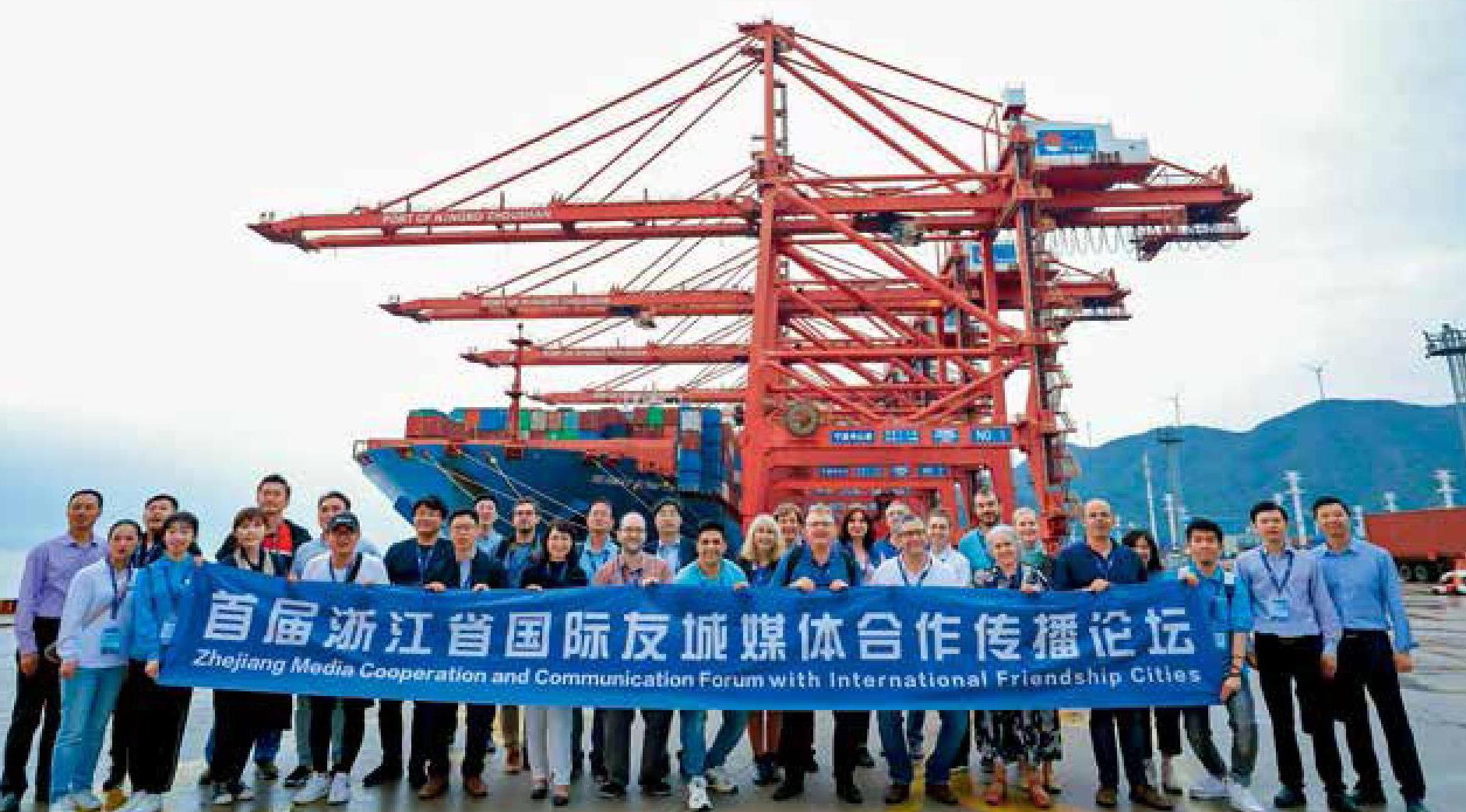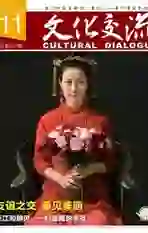从小镇到大港,“打卡”浙江网红地
2019-12-13屠悦
屠悦

斯洛伐克第八大城市马丁市,8岁的罗伯特·盖多什在家中看李小龙耍双截棍时,怎么也没想到16年后,24岁的他会踏上中国的土地,来到了马丁市的友好交流关系城市——浙江宁波。这位高个欧洲青年在宁波的“母亲河”姚江边散步,还学会了用普通话说“萌萌哒”“皮一下”“C位出道”这样的当下中国网络流行语。
罗伯特此次是以马丁市政府新闻及新媒体官员的身份,参加首届浙江省国际友城媒体合作传播论坛的采访活动。
金秋十月,来自亚洲、欧洲、非洲、美洲等67个国家的近120位媒体代表、海外知名智库高层,分A、B两条线,分头走进浙江各地。A线的媒体朋友,喝乌镇的乌米酒,吃杭州的葱包烩,看宁波舟山港,逛良渚博物院,一路过来,他们亲身感受着不同文化碰撞出的浙江故事。
拉斯戴尔:乌镇是浙江威尼斯
2007年,刘若英为乌镇代言,说了那句经典的台词:“来过,便不曾离开。”用这句话来形容采风团里每个人的心境,再好不过。
在此次采风活动中,乌镇简直成了团宠。既保留了古老典雅的风韵,又吸收了现代开放的风采,乌镇对这些国际嘉宾来说,是个有魔力的地方。
小桥、流水、人家,原汁原味的江南水乡风情,乌镇像充满诗意的画卷在他们眼前铺陈开来。“这是浙江的威尼斯!”法国作家、雨果文学会主席、世界《雨果研究动态》周刊主编阿兰·阿赫诺·拉斯戴尔先生踏上摇橹船的那一瞬间脱口而出。顷刻,“浙江威尼斯”这个称号在采风团里流行开来。
芬兰媒体人图里·阿尔泰奥有着一双湛蓝色眼睛,年轻漂亮的她走在团队里总是很显眼。她把乌镇称为“童话”,甚至想象将来有一天能來这里举办婚礼,因为“实在太浪漫了”。
这种浪漫,北京俄罗斯文化中心公关经理莲娜女士在到达乌镇的当晚,用了两个半小时来细细体验。拍照、留影,走过一条条青石板路的她,已经全然忘记时差带来的疲惫,沉醉在迎面而来的浓郁的历史和文化气息中。
在乌镇西栅的染坊晒场,巴塞罗那电视台首席执行官魏森举着自拍杆,穿梭在一幅幅随风飘舞的蓝印花布中。对着手机摄像头,他兴奋地称自己像坐了“时光机器”一般,一下子穿越到了中国古代。
在这个采访团里,说着一口流利中文的魏森是个“红人”。所到之处,他的身后总能传来很激动的声音:“看,那个老外会说中文!”
其实这个“老外”已经在北京工作生活了12年,娶了一位北京姑娘结婚生子,他的名字“魏森”也是太太取的,寓意像树木一样笔直生长,意为“是个靠谱的人”。魏森开玩笑说,“应该跟她确认一下,这些年来,我算不算得上靠谱。”
然而,毫无疑问,在推动中国和西班牙跨文化交流上,魏森是靠谱的——2019年春节,电视片《这里是中国》在巴塞罗那电视台开播;今年9月初,巴塞罗那电视台和浙江达成合作协议,开展优质节目资源的交流与推广。“随着中国与西班牙的交流越来越深入,西班牙观众对中国传统文化的兴趣也越来越浓烈。”魏森说,文化最有意思的地方是它的共通性,希望有更多的人能够像他一样,来中国和浙江实地认识和探索。
传统的,也是世界的。当它跟现代碰撞,激荡出的便是国际化的火花。
10月,世界互联网大会、国际戏剧节在乌镇相继举行。包括魏森在内的采访团看到关于这两次盛会的宣传牌,兴趣十足。南非资深外交官、前驻外大使格特·格罗布勒先生感慨,在乌镇,吸引外国人的中国传统文化与现今时代的飞速发展很好地融合在一起,“不仅没有丢失自己原本的色彩,反而更加华丽。”
卡瓦略:把“如意”挂在客厅
在魏森看来,中华文明是充满魅力的,也是很有智慧的。
来乌镇之前,魏森以为乌镇只是一个旅游景点。但实地参观后,乌镇的水系给他留下了深刻的印象,许多看似古老的东西,在今天看来依然先进,“这里的古人如何管理水系,他们如何理解水对于人类生活的重要性,是我很想探寻的。”而多年的记者生涯也促使他一路观察和思考——浙江是如何保护和传承历史文明的,“我们不能真正地保持传统,但是我们可以挖掘我们的过去,了解我们从哪里来。”
采风团中有不少嘉宾抱有同样的想法。在乌镇的前一站良渚博物院,马里共和国驻中华人民共和国大使馆前文化参赞、现浙江师范大学非洲研究院高级研究员约罗·迪亚洛,在良渚文明追溯历史墙前驻足良久。恰巧,那天还有一些学校组织学生来博物院学习和参观。面对这处实证中华五千年文明史的圣地,约罗·迪亚洛表示,良渚之行让他很好地了解到浙江是如何进行传统文明的教育和传承。
“文明是没有国界的,促进国际间的文化交流在当今全球化趋势下势在必行。”关于这一点,约罗·迪亚洛在慈溪的傅家路村收获了更进一步的体验。傅家路村位于浙江宁波慈溪市崇寿镇西南部,作为美丽新农村的代表之一,近年来傅家路村先后获得浙江省文化示范村、浙江省森林村庄、浙江省卫生村、“美丽乡村、幸福家园”建设优秀村等各种荣誉称号。
走进傅家路村,嘉宾们一起来到广场,前方的楼阁中,几个穿着青色旗袍的女孩子在台上演奏民乐;广场两边的阁廊里,有村民在剪剪纸和写书法。浓郁的中国风深深吸引了这些国际媒体人,前一刻他们还在车里闭目养神,这一刻已经欢乐地和村民交流起来。
第一次来中国的巴西TVT电视台媒体人马斯洛·戈多伊跃跃欲试,他拿起毛笔临摹了一个“仁”字;葡萄牙新闻日报执行总编卡特琳娜·卡瓦略(Catarina Carvalho)则请村民为她写了“如意”二字,说回去以后要装裱起来挂在客厅。
芬兰姑娘图里·阿尔泰奥说,在现代化的社会,传统文化正在一点点消失,这是“全世界都在发生的事”,而浙江在传承方面“作出了很好的示范,值得我们国家借鉴”。
酒井美树男:
浙江人越来越有自信
40岁的马修·赫德也是第一次来中国。作为英国达特茅斯电影有限公司经销部主管的他,之前印象中的中国是一个“快速发展”的国家,然而,这次来浙江实地参观,他真心觉得浙江的现代化建设超越了自己的想象。
“中国制造的东西很快且有效地分销到全世界,跟其他国家建立联系,在世界舞台上竞争,所有这些展现了中国是个经济大国,这也是我看到的中国故事、浙江故事。”说这句话的时候,马修正在宁波舟山港。巨大的货轮停泊在港口,装船机上下挥舞长臂,大型集装箱鳞次栉比,岸上吊车来回穿梭,眼前这繁忙又壮观的景象,让马修顿生来这里拍纪录片的冲动。
卡特琳娜·卡瓦略也终于亲眼得见这个曾数次出现在她报道中的地方,那些将无数产品运送到葡萄牙的超级大船近在咫尺。一瞬间,她更加了解那个让欧洲乃至世界无限好奇的中国,“宁波舟山港的意义不仅仅只是世界最大港口之一,它更是连接着世界……中国发展真的很迅猛。”
说到发展,杭州湾跨海大桥让采风团赞叹不已。杭州湾跨海大桥南起宁波慈溪,北至嘉兴海盐,全长36公里。自2008年5月1日建成通车以来,已有超1.27亿辆车通过它跨越杭州湾,平均每两秒钟就有一辆车驶过。
建造这样一座大桥,在海中如何打桩成了采风团中每个人心中的疑问。走进海天一洲大桥展示馆,首先映入眼帘的是这样一句话:“这是一座跨越梦想的大桥。”马斯洛·戈多伊感叹,“每个人一生中必须来这里打次卡,很值得。”
不仅是杭州湾跨海大桥,还有体验乘坐高铁,以及参观杭州梦想小镇和中国(杭州)人工智能小镇,都让这些国际媒体人和学者感受到浙江的国际化,惊叹城市发展的多样性。“我看到了浙江的另一种情态,宏大且精致,看到了这里的人们勤劳并充满智慧。”捷克媒体嘉宾雅娜·帕夫洛娃这样评价。
奥地利OKTO国家电视台首席执行官杨可安已经记不清自己是第几次来浙江了,他的中文名字是杭州的一位朋友起的,他還有个非常接地气的昵称,叫“老杨”。“老杨”把杭州称为自己的第二故乡。“这几天的采风,让我更加走进浙江人的真实生活,看到浙江在基础设施、社会、经济等方面的迅速发展。这一切都让我打开眼界,我看到了浙江不同寻常的一面。”
年轻的斯洛伐克小伙罗伯特·盖多什也看到了“浙江不同寻常的一面”——城市的绿化。无论是城市,还是高铁沿途,郁郁葱葱的树木花草都吸引了他的注意力,“看得出来,浙江在重视环保问题。”
事实上,注意到这点的,还有卡特琳娜·卡瓦略和格特·格罗布勒。尤其是格特·格罗布勒,整个行程中,特别喜欢植物的他用手机拍摄了不少沿路的花花草草,“浙江在环境保护方面的力度还有很大的。”
格特·格罗布勒还拿此次采风行程中的慈溪傅家路村举例,表示村里垃圾分类固定回收点给大众提供了垃圾分类和再回收利用信息,相比之下,南非进步缓慢,“我们可以从中国,从浙江学到很多东西。”
日本福井电视台专务酒井美树男也是浙江的老朋友了,这是他第五次到访,“以前听人介绍杭州,都说杭州是在上海隔壁,现在也会说上海在杭州隔壁。这样的介绍很好地说明了一切。浙江人越来越有自信。”酒井美树男说此次浙江之行,让他强烈感受到浙江人的幸福感。
因为,正如“老杨”说的,“未来在这里交汇”。
From October 11 to 14, the first Zhejiang Media Cooperation and Communication Forum with International Friendship Cities took place. About 120 media workers and representatives of think tanks from 67 countries of Asia, Europe, Africa and Americas attended the forum. On the afternoon of October 11, the opening ceremony was held in Hangzhou. On the following three days, the participants visited different places to experience. Among the places they visited were Wuzhen, an ancient canal town which now hosts the World Internet Conference annually, Ningbo-Zhoushan Port, and Liangzhu Museum.
Wuzhen in northern Zhejiang was the favorite of the media workers and representatives of international think tanks. The ancient town typical of the river towns in the south of Jiangsu and the north of Zhejiang appealed to them very much. Alain Arnaud Laster, an author from France and editor-in-chief of an academic magazine of Victor Hugo studies, stepped into a boat for a river tour and commented it was like Venice. Tuuli Aaltio from Finland dreamed of having her wedding ceremony in Wuzhen, every inch of which looked and felt like a fairytale to her.
Elena Romanenkova, a public relations manager from the Russian Center in Beijing, spent more than 2 hours meandering alone in Wuzhen in the evening. She felt spellbound by the charms of the ancient town. She took a lot of photographs. At the sunning ground of a dyeing workshop in Wuzhen, Sergi Vicente Martinez, CEO of a television studio in Barcelona, Spain, felt as if he had arrived in ancient China through a time machine. He speaks Chinese fluently and has been in China for 12 years. His television studio works in close partnership with Chinese television studios to promote friendship between China and Spain and Chinese culture in Spain. He hopes more people from his home country will visit China to take a look.
Gert Grobler, a senior diplomat from South Africa, commented that Wuzhen presents a perfect picture of traditional Chinese culture and fast growth in modern times, which attracts the attention of international visitors. “Chinas modernization adds colors to its traditional charm,” says the retired ambassador.
What also caught the eye of the forum participants in Wuzhen were the ongoing preparations for the upcoming World Internet Conference and Wuzhen International Theater Festival, which were to be held in Wuzhen from October 15 on.
The visit to Zhejiang in October 2019 brought new impressions to the forum participants. Sergi Vicente Martinez says that he was under the impression in the past that Wuzhen was just a tourist attraction. The visit to Wuzhen opened his eyes to the ancient wisdom of Wuzhen people. “I want to explore how the ancient people here managed the network of rivers and how they got to understand the importance of water to humanity. We cant really keep our tradition, but we can look into our past and understand where we came from.”
Yoro Diallo, a former cultural attaché at the embassy of the Republic of Mali in Beijing and now senior research fellow with African Studies Institute at Zhejiang Normal University, was deeply impressed with the history of Liangzhu in a western suburb of Hangzhou. The forum participants visited Liangzhu Museum before they went to Wuzhen. While he was examining the timeline of Liangzhu Culture presented on a huge wall at the museum, he saw groups of students visiting the museum. The visit to the museum made him understand better how Zhejiang emphasizes the role education plays in carrying on the ancient civilization and traditional culture.
The participants visited Fujialu, a village in Cixi, a county-level city in Ningbo in eastern Zhejiang. The village is a model of rural development with a lot of honors from local and provincial governments. The village shows how it keeps rural economic prosperity while urbanization surges across the country and how traditional culture is well maintained and carried on in this small rural community. The international visitors met villagers who practiced calligraphy, played traditional musical instruments. Some visitors tried their hands at calligraphy.
Matthew Hird, a sales manager of a movie company based in Dartmouth, a port city in southwest England, commented that the visit to Zhejiang updated his previous impression. He had thought China was a fast-developing country. What he witnessed at the Ningbo-Zhou Port was more than he had imagined. “All the commodities made in China are rapidly and efficiently shipped out to the whole world. These commodities connect China with other countries. This shows China is an economic powerhouse in the world. This is the China story and Zhejiang story I see here,” comments Matthew Hird. He wants to do a documentary at the port.
Catarina Carvalho, a newspaper editor in chief from Portugal, was excited to see cargo ships at the port. The port had appeared in her newspaper many times, but being so close to the colossal vessels that would transport goods to her country was a thrilling experience. At that moment, she understood China better than ever before. “The Ningbo-Zhoushan Port is not just one of the worlds biggest ports. It connects China to the world. I see Chinas booming growth.”
Christian Jungwirth, CEO of OKTO television studio of Austria, had visited China many times. “In Zhejiang I see peoples real life and fast development of infrastructure, and fast social and economic growth. This is an extraordinary side of Zhejiang. The visit is eye-opening,” says the CEO.
It was the fifth visit Sakai Mikio, a senior managing director at Fukui Television, Japan, paid to Zhejiang. “In the past, when people talked about Hangzhou, they usually said Hangzhou was a city next door to Shanghai. Nowadays, people say Shanghai is a city next door to Hangzhou. This speaks a lot about Hangzhou. The people in Zhejiang are increasingly confident,” says Sakai Mikio.
